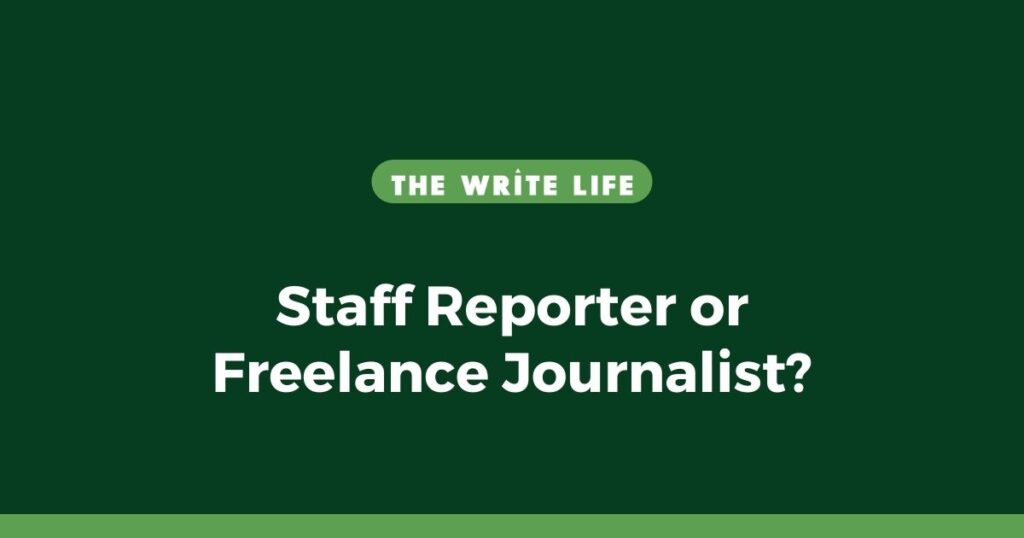Want to start your journalism career by working in the media industry as a writer? You generally have two options: You can seek employment as a staff member of a publication, or look for freelance writing opportunities.

As the number of full-time journalism jobs continues to decline and major corporations continue to lay off their editorial staff in droves, many aspiring writers feel there’s more stability in freelancing.
Which journalism career path is right for you? Two options
If you’re new to the industry and trying to decide which path is right for you, here’s what you need to know about being a freelancer versus a staff journalist.Freelance reportingThere are a couple of key advantages to starting off your journalism career as a freelancer. Staff reportingThere are pros and cons to each option—but if you’re new to the world of professional writing jobs, how do you know which is right for you?
If you’re new to the industry and trying to decide which path is right for you, here’s what you need to know about being a freelancer versus a staff journalist.
I’ve been on both sides of the equation, and now as an editor who manages both staff writers and a freelance team, I have an even greater appreciation for the roles and responsibilities of each group.

Freelance reporting
As freelance writer Danielle Corcione wrote on Muck Rack (sorry, the link is no longer live), freelance writers often maintain full editorial control of their projects: They can generally choose their own assignments, whether it’s something they pitched an editor or something they elected to write based on an editor’s request.
Freelance reporters also aren’t typically bound by non-compete agreements, meaning they can write for and get published by a wide range of publications. This kind of variety and freedom is highly appealing to writers who want to try working with different topics, writing styles and editors.
There are a couple of key advantages to starting off your journalism career as a freelancer.
There’s a very low entry barrier and you don’t need a journalism degree to do it, so you can start freelancing while you’re still in school like I did, and start building up a portfolio for when (or if) you decide to look for a full-time writing job. If you’re not sure where to start looking for gigs, you can check out these 20 websites.
The downside, of course, is that you lose much of the stability that comes with traditional employment. You’re responsible for securing your own benefits and budgeting for your income and self-employment taxes (since those won’t automatically be deducted as they would when you’re on payroll).
It’s also a lot easier for an editor to drop a freelancer than a staffer: A change in the budget or turning in a few bad assignments could mean that your income stream from that publication abruptly ends, so you’ll always need to be planning your next move.
If you’re considering the freelance path, it’s a good idea to get comfortable pitching editors at a variety of publications and coming up with useful, relevant story ideas for them. When you do pitch, proofread your message for spelling, grammar and punctuation, as well as thoroughly researching the publication and its typical content and style.
Staff reporting
Although some might argue traditional journalism is dead (along with the jobs that came with it), there are still full-time jobs to be had in the media industry. They just might look a little bit different than the newspaper reporter jobs of decades past.
While straight print reporting jobs do still exist, most journalism positions today include a digital component.
Many staff writers are expected to understand search and social media trends to help inform their story ideas, and knowing how to create and leverage visual assets (e.g. infographics and video content) is a huge plus. These skills are also valued in freelancers, but writers who can offer the complete package stand to go far in the industry.
As mentioned above, a staff writing job also comes with certain employment benefits and, in many cases, a more predictable schedule that make it more appealing than freelancing. On the flip side, you may end up trading some of your creative and editorial freedom: Tight deadlines, editor demands and last-minute changes of direction are common in newsrooms, and you may find yourself somewhat at the mercy of your company’s leadership and executive teams.
However, like freelancers, staff writers are often encouraged to pitch their editors, especially as they move up the ranks. You’ll need to be able to come up with well-informed, well-researched pitches—but unlike freelancers, your income won’t depend on whether your pitch gets accepted or not.
Because full-time reporters are typically dedicated to a single publication (many media companies have policies against freelancing for direct competitors), they’re able to immerse themselves in the specific beats and audience of that outlet. Therefore, it may be easier for you to come up with “good” pitches as a staffer.
Still not sure which path to take? Try freelance writing as a side hustle while you work as a staff journalist, just to see which you prefer (or you may decide you can successfully juggle both).
Either way, it’s important to understand what your responsibilities might entail and make an informed decision about your writing career.

If you’re wondering what opportunities exist for freelance writers in 2024 (hint: there are plenty!) then make sure to register for the free webinar coming up on September 26, 2024 called How to Successfully Break Into Journalism in 2024! You’ll learn about the different types of journalism and what you may best be suited for, and the top skills successful journalists need and what it can lead to.












 Bengali (Bangladesh) ·
Bengali (Bangladesh) ·  English (United States) ·
English (United States) ·